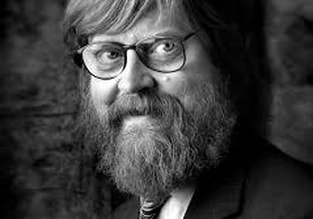Jonathan James-Moore
|
In his obituary for Jonathan James-Moore, Pete Atkin was right to stress the ability of the young Jonathan, amiable colossus of the Foolights in our late-sixties era, to perform a script at a level beyond the dreams of its writer. Since his performer’s understanding of a written line was at the heart of the judgment he brought to his influential career as a radio producer, it might be worth recalling just how good he could be at what we used to call “doubling the laugh”. The laugh can’t be doubled unless the performer understands exactly how the joke works, and there was nobody quite like Jonathan for wanting to know what every comma in the script was up to. One of my own scripts, called “Hell Below Zero”, was a monologue for an all-purpose BBC winter sports commentator whom we called Alexander Palace. Suitably dressed in a white crew-neck sweater with Olympic rings, Jonathan would get his first laughs as soon as the spotlight came on. The bobble-topped beanie probably helped.
|
But as the disaster of Alexander Palace’s jingoistic commentary developed like a fatuous avalanche, what helped most was Jonathan’s capacity to pause after the latest solecism and let the audience enjoy the implications. At one point he had to express his doubts that the British ski champion, who had done a personal best in the downhill, would do quite so well over the same course (“I, for one, would be very surprised...”) in the next day’s twin event of the downhill, the uphill. The line got a solid laugh, which pleased me very much. But the laugh doubled when Jonathan’s face registered the helpless defiance of a patriotic bone-head who knows that he has got something wrong yet takes pride in his determination to press on regardless. It was a character study, and an object lesson in how to let a line breathe. From then on, I always tried to give the performer time, after getting a laugh with his voice, to get another with his face. In later years the performer was usually myself, but I learned how to write it that way from watching Jonathan perform. I could never have learned how to perform from watching him perform: he was just too good.
He had everything as a stage performer except eyesight. Despite those heavy-duty spectacles of his, the world was a bit of a blur even in daylight, and in sudden darkness he was slow to adjust. One night on the Edinburgh Fringe, where his routines were helping to sell out the late-night Footlights revue in the Lauriston Hall (we had to put on extra performances), the lights went out on Alexander Palace’s final verbal catastrophe and the black-clad assistant stage manager who had been assigned to go out and get him forgot to do so. A physical catastrophe duly followed. All too aware that the lights would soon be coming up again, Jonathan tried to get off stage by himself. He did, but instead of going off through the door at the side, he went off over the front of the stage and five feet straight down into the audience, where he landed beanie-first. By the time the lights went up again he had included himself in the front row. The two people who made room for him thought it was part of the show, and they were right. Where Jonathan James-Moore was, it was always part of the show, and largely because of his penetrating respect for comic writing, the gift he wasn’t given but was born to help bring alive — and that, of course, was his gift.
(Guardian, December 2, 2005)
He had everything as a stage performer except eyesight. Despite those heavy-duty spectacles of his, the world was a bit of a blur even in daylight, and in sudden darkness he was slow to adjust. One night on the Edinburgh Fringe, where his routines were helping to sell out the late-night Footlights revue in the Lauriston Hall (we had to put on extra performances), the lights went out on Alexander Palace’s final verbal catastrophe and the black-clad assistant stage manager who had been assigned to go out and get him forgot to do so. A physical catastrophe duly followed. All too aware that the lights would soon be coming up again, Jonathan tried to get off stage by himself. He did, but instead of going off through the door at the side, he went off over the front of the stage and five feet straight down into the audience, where he landed beanie-first. By the time the lights went up again he had included himself in the front row. The two people who made room for him thought it was part of the show, and they were right. Where Jonathan James-Moore was, it was always part of the show, and largely because of his penetrating respect for comic writing, the gift he wasn’t given but was born to help bring alive — and that, of course, was his gift.
(Guardian, December 2, 2005)
